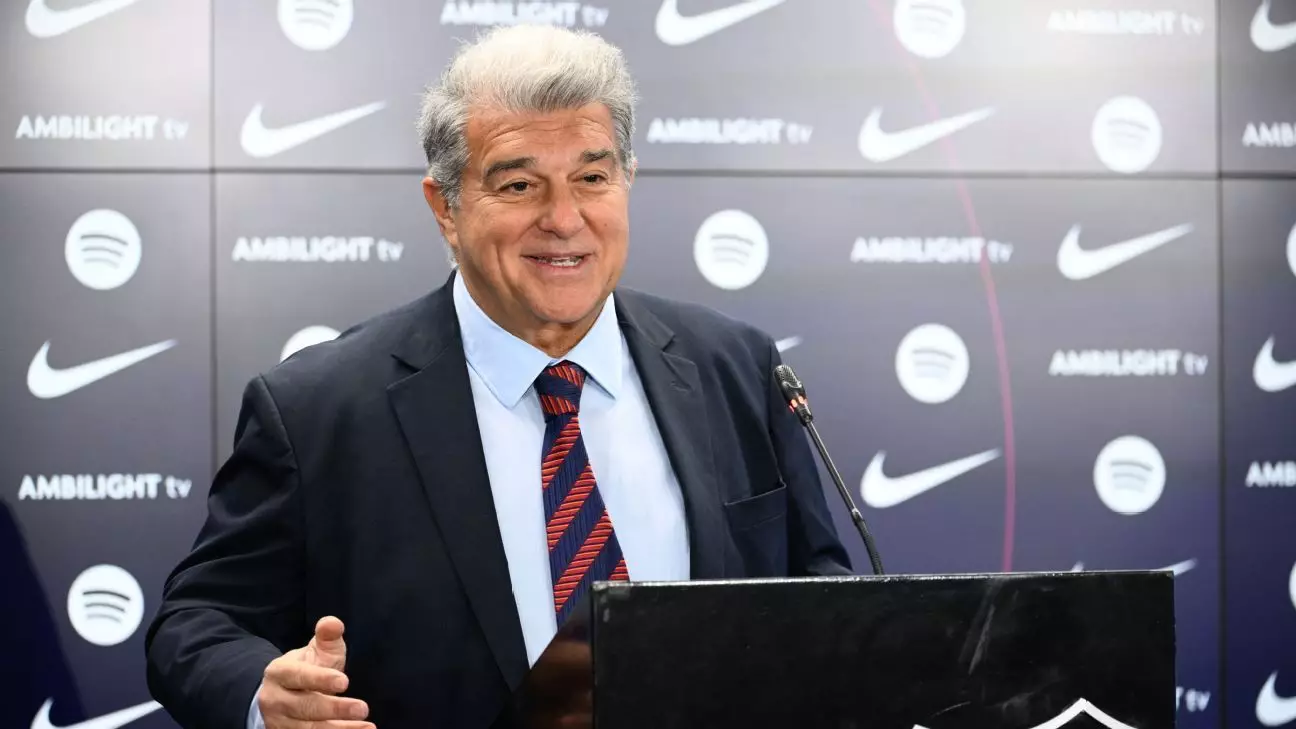FC Barcelona, one of the most prestigious football clubs worldwide, has found itself embroiled in a conflict surrounding the registration of players Dani Olmo and Pau Víctor. Recently, club president Joan Laporta took the stage to defend the organization against aggressive criticisms, painting a picture of a well-coordinated campaign aimed at undermining the club’s stability. Tensions reached a peak when LaLiga and the Royal Spanish Football Federation (RFEF) cited the club for a missed December 31 deadline to demonstrate compliance with Financial Fair Play (FFP) regulations, thereby blocking the registrations for both players.
The failure to register these potentially valuable assets could have significant implications for the club’s performance and ambitions for the upcoming season. However, Laporta remains steadfast in asserting that FC Barcelona submitted all necessary paperwork in a timely manner and that external forces may be aiming to take advantage of this administrative misstep to destabilize the club during a critical juncture.
In a press conference that stretched nearly two hours, Laporta decried the negative narratives circulating about Barcelona and emphasized the historical resilience of the club, which has withstood numerous trials over its storied 125-year existence. He suggested that such coordinated attacks are not novel to Barcelona, acknowledging that any attempt to discredit the club would ultimately fail. His rhetoric points to an unwavering belief that the spirit and history of Barcelona are unassailable, no matter the provocations.
Laporta also subtly addressed dissent from within the club, particularly targeting factions that have openly called for his resignation. This internal division complicates matters for the club, as Laporta criticized individuals who have sided with external forces seeking to harm Barcelona. By highlighting this internal strife, he underscores the broader vulnerabilities that arise when loyalty within the organization is fractured.
Laporta’s frustrations were directed not only toward critics from outside the club but also towards rival teams. Several clubs, including Atlético Madrid, Valencia, and Espanyol, issued statements denouncing the ruling by Spain’s supreme sports council that temporarily reinstated Olmo and Víctor. In what can be interpreted as a show of solidarity among rivals, these clubs stepped forward to express dissent regarding Barcelona’s handling of the situation. Laporta’s lament about their opposition underscores the competitive tension that exists within Spanish football.
While every club has the right to express their opinion regarding governance and regulations, such public displays against Barcelona signal a palpable rivalry—a rivalry that merges competitive spirit with administrative fragility. Laporta’s calls for unity underscore how deeply intertwined club loyalties can impact external perceptions and operational capabilities within the league.
Addressing the financial narratives that have been part of the fallout, Laporta presented a bold defense centered around Barcelona’s financial strategy. He claimed that new contracts, such as a lucrative agreement with kit supplier Nike, are set to elevate the club’s revenue significantly, arguing that this financial influx should have assured compliance with LaLiga’s FFP rules. In addition, he reminded the public of the recent sale of VIP seats at Spotify Camp Nou, expected to yield approximately €100 million.
This strategic financial maneuvering is crucial for the club’s future, as it ties directly into their ability to operate within the FFP framework and enhance their competitiveness. By illustrating these financial streams, Laporta aims to allay fears about Barcelona’s fiscal health and emphasize the club’s forward trajectory.
As Barcelona grapples with the unfolding drama surrounding player registrations and the external challenges posed by rivals and critics alike, the immediate future looks precarious yet not hopeless. Laporta’s assertions highlight not only the complexity of navigating football’s regulatory landscape but also the profound impact of public opinion and intra-club loyalty.
While the criticisms and challenges may continue to escalate, the real task lies in how FC Barcelona will adapt and ensure that such situations do not impede their goals on and off the pitch. The club’s rich history speaks to its ability to rebound from adversity, and preserving that legacy will require collective effort, strategic planning, and perhaps most importantly, unity within the organization.

